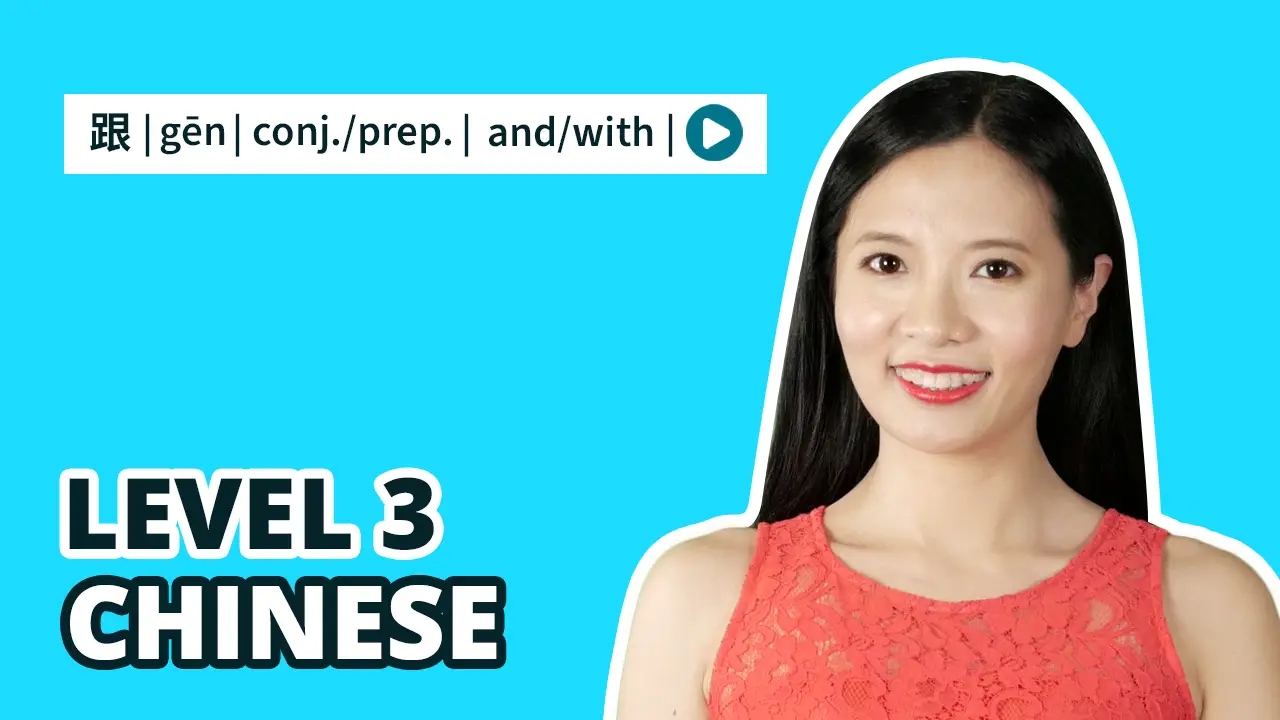Level 3 Lesson 4.1 – 不但 而且 拿 换 脏 年轻 没事
HSK 3+ VOCABULARY: 不但 而且 拿 换 脏 年轻 没事
In this video lesson we'll learn the vocabulary in Lesson 4 and practice them with a lot of example sentences. For new Chinese characters, we'll learn how to write them and know about their structures and origins in the attached writing sheet.
- VOCABULARY: 不但 而且 拿 换 脏 年轻 没事
- CHINESE CHARACTERS: 而 且 拿 换 脏 轻
VOCABULARY LIST

VOCABULARY USAGE
1. 不但 búdàn · HSK 3
conj. 连词 liáncí ▸ [used at the beginning of the first sentence in a Progressive Complex Sentence] not only
2. 而且 érqiě · HSK 3
conj. 连词 liáncí ▸ [used at the beginning of the second sentence in a Progressive Complex Sentence] but also
"不但……而且……" is a very common structure in Chinese, we will learn about it in Lesson 4.2.
3. 拿 ná · HSK 2
v. 动词 dòngcí ▸ to grab, take, hold, or fetch something with a hand
- Tā shǒu li ná zhe yì dǐng màozi.
他手里拿着一顶帽子。
He is holding a “ding” (of) hat/beanie in his hand. - Yéye náchū yǎnjìng, kāishǐ kàn bàozhǐ.
爷爷拿出眼镜,开始看报纸。
Grandpa took out (the) glasses, (and) started to read newspaper. - Chī fàn le, kuài qù chúfáng ná wǎn.
吃饭了,快去厨房拿碗。
(It is time to) eat meal, hurry up (and) go to (the) kitchen to get (the) bowls.
4. 换 huàn · HSK 3
v. 动词 dòngcí ▸ to change; to exchange
- huàn yīfu
换衣服
to change clothes - huàn gōngzuò
换工作
to change job - huàn nán péngyou
换男朋友
to change (one’s) boyfriend - huàn qián
换钱
to exchange currency / to change a big bill into small changes or vice versa / to exchange something for money
- Wǒmen míngnián jiù yào huàn yí tào xīn fángzi zhù le.
我们明年就要换一套新房子住了。
Next year we soon will move into a new house/apartment to live. - Wǒ huàn le yí ge xīn de Zhōngwén míngzi, nǐ juéde zěnmeyàng, bǐ yǐqián nà ge hǎotīng ma?
我换了一个新的中文名字,你觉得怎么样,比以前那个好听吗?
I changed one “ge” (of) new Chinese name, how do you think, (does it) sound better than that one before? - Nínhǎo, néng bu néng bāng wǒ huàn yíxià qián? Wǒ méiyǒu shí kuài de, zhǐ yǒu yì bǎi kuài de.
您好,能不能帮我换一下钱?我没有十块的,只有一百块的。
Excuse me, can (you) help me exchange (the) money? I (do) not have 10-kuai (bills), (I) only have 100-kuai (bills).
5. 脏 zāng · HSK 3
adj. 形容词 xíngróngcí ▸ dirty; not clean
- Kùzi zāng le, xǐ yíxià ba!
裤子脏了,洗一下吧!
(The) pants (are) dirty (already), wash (them) really quick! - Zhè shuāng xié hé nà shuāng xié yíyàng zāng.
这双鞋和那双鞋一样脏。
This pair (of) shoes (are) as dirty as that pair (of shoes). - Xiǎogǒu zāngzāng de, wǒmen gěi tā xǐ ge zǎo ba!
小狗脏脏的,我们给它洗个澡吧!
(The) little dog (looks) dirty(/that it needs a bath), (let) us bathe a bath for it.
6. 年轻 niánqīng · HSK 3
adj. 形容词 xíngróngcí ▸ young
- niānqīng rén
年轻人
young people - gèng niánqīng
更年轻
more young; younger
- Nǎinai niánqīng de shíhou zài Běijīng shēnghuó guo.
奶奶年轻的时候在北京生活过。
Grandma(,) when she was young(,) (had) lived in Beijing (before). - Nǐ māma zhǎng de yòu niánqīng yòu piàoliang.
你妈妈长得又年轻又漂亮。
Your mom grows/(looks) young and also beautiful. - Háizi, wǒ yǐjīng bù niánqīng le, dàn nǐ gēn wǒ bù yíyàng, nǐ hái yǒu hěn duō hěn duō de shíjiān.
孩子,我已经不年轻了,但你跟我不一样,你还有很多很多的时间。
Child, I already (am) not young (anymore), but you (are) not the same with me, you still have so much so much time.
7. 没事 méishì · HSK 1
phrase. 短语 duǎnyǔ ▸ fine; okay; not a big deal; don’t worry about it
1 Comment
Leave a Reply
You must be logged in to post a comment.

别拿这个衣服,你要先洗洗吧。
在车变脏以前,我每个星期天都洗车。
这个衬衫太小了,你可以帮我换一个大的吗?
我年轻的时候,住过很多地方,住过英国,西班牙和加拿大,现在住在美国。